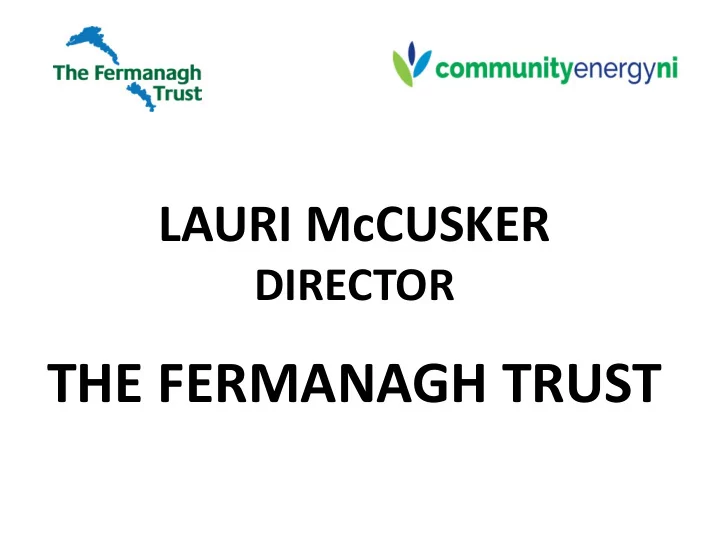

LAURI McCUSKER DIRECTOR THE FERMANAGH TRUST
The Fermanagh Trust - Community Owned – Community Led - Social Enterprise
Factors of Production -Resources which are building blocks of the Economy - What people use to produce goods & resources
Land (inc. any natural resources inc Forests) Labour – people’s contribution Capital – Machinery, Tools & Buildings *Money can be used to buy Capital* Entrepreneurship – Land, Labour & Capital to earn a ‘profit’
Maximising Community Outcomes from Wind Energy Developments • Reasons for the research • The policy context in Northern Ireland • Lessons from elsewhere • Community Planning • The future for Northern Ireland
Aim/Objectives The research aimed to explore the opportunities that exist for communities to engage with commercial onshore wind energy development by examining the following: • Undertake an analysis of community benefits provided by wind energy developers in the UK • Investigate the potential of community ownership models and identify good practice towards the provision of community benefits • Investigate the approach taken by government, the wind industry and the voluntary sector in engaging and working in partnership with local communities
Types of Community Benefits in the UK • Local contracting and jobs • Benefits in kind • Community funds • Community ownership (sometimes referred to as local ownership)
Community ownership is challenging, and has not been as widespread as in other counties in the UK Challenges can include: • The regulatory environment • Planning and legislative issues • The ability to access finance during the development process • Time and commitment from the community • Lack of technical experience or ‘know - how’ to progress a project
Benefits of Ownership • Higher levels of social acceptance of wind energy • The development of new local knowledge and skills • Enhancing social and technical and social innovation • Benefits resulting from the social interaction and cooperation and interaction which is needed to develop such a project • Basing local incomes on a sustainable use of local resources • Increasing stakeholders knowledge of energy and environmental issues • Substantial financial benefits Cowell, R., Bristow, G., Munday, M. and Strachan, P. (2008) Wind Farm Development in Wales: Assessing the Community Benefits , a research project for the Welsh Assembly Government, Cardiff.
Community Ownership Models • Full ownership • Part ownership • Community/Developer joint venture • Co-operative
Recommendations (based on good practise) Communities 1. A not for profit organisation to take lead role in; • Establishing good practise guidance inc. policy on community engagement & promoting a toolkit on community benefits. 2. All local communities to take an active role when developments are being considered – exploring a range of community benefits 3. Local community development organisations to examine & where possible develop community ownership models
Developers 4. Community Benefit Fund • Minimum initial payment £2,000 per MW instilled capacity • Minimum annual payment of £2,000 per MW instilled capacity (index linked) 5. Community Ownership • Offered as part of a community benefits package 6. Community Engagement • Clear protocols implemented, based on good practice & include post construction relationships
Local Councils 7. Guidance protocols to be formally established Government 8. D.E.T.I – implement policies to support communities to become proactive i.e. local energy assessment fund 9. D.A.R.D – commercialisation forestry estate for wind farm developments 10. Community Benefit Register 11. 1 Government Department to take lead role
Key Developments since 2012 Government • Discussions with Industry • Commitment to Produce Action Plan on Community Energy • Community Benefits Register • Forestry Land – Wind Farm Developments Communities • Increase Capacity • Community Energy NI
Community Energy has the ability to: • Generate a long-term sustainable income for communities; • Help to empower & give autonomy to local people; • Help to strengthen communities & help to tackle pressing local issues such as fuel poverty & help to raise energy awareness
• Save communities money on their energy bills; • Strengthen communities & provide greater community cohesion & resilience; • Help to tackle climate change; • Contribute to the local economy; • Allows energy to be generated locally & enables people to have greater control over their energy supply.
Advancing Community Energy 12 Recommendations include: • Community Ownership • Planning & Local Land (Community Plans) • Public Sector Led Example
Key Issues • Government Commitment • Direction of Travel • Rural Development Programme • Challenging Communities
Recommend
More recommend